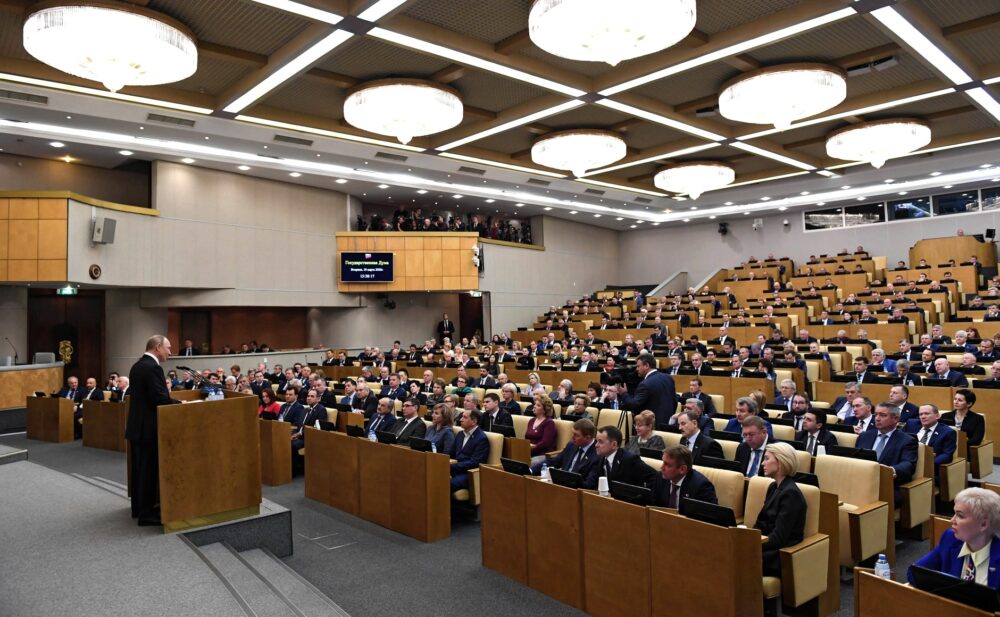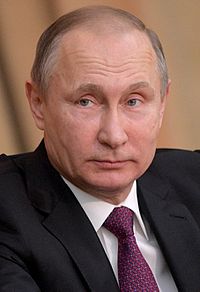
By Natylie Baldwin, Consortium News, 6/30/20
Voting in Russia began on Friday and will conclude Wednesday on a referendum over a series of constitutional changes that would enhance the powers of the presidency, including, most controversially, allowing President Vladimir Putin to potentially remain in office for 12 more years beyond the end of his term limit in 2024.
There is more to the proposed changes, however, that bear looking at.
In mid-January, Putin announced his proposals during his annual address to the Federal Assembly. Several days later, he submitted the initial draft law to the Duma, Russia’s lower house.
The first few paragraphs reiterated some of the changes he outlined in his speech, including restrictions for individuals running for president of Russia and other major federal offices such as prime minister, cabinet members, parliamentarians, regional governors and judges.
These include candidates’ restrictions on dual citizenship and residency and, for the president, a requirement of continuous residency in Russia for at least 25 years. As others have pointed out, these rules effectively prohibit the children of the current political class from running for major office in Russia since most of them have studied and/or lived in the U.S. or Europe and have therefore had long-term residency in a foreign country.
Another amendment will require that Russia’s constitution take precedence over international law if the two are in conflict. Putin’s draft law stated:
To protect national sovereignty, it is proposed in the draft law that the decisions of interstate bodies based on the provisions of international treaties signed by the Russian Federation shall not be implemented in Russia if their interpretation contradicts the Constitution of the Russian Federation.
With respect to the expanded responsibilities of the parliament – consisting of the Federation Council (upper chamber) and the Duma (lower chamber) – the draft law summary states:
To make interaction between the representative and executive branches of power more effective, to strengthen the role of the State Duma and parliamentary parties, as well as to enhance the responsibility of members of the Government, it has been proposed that the Constitutional provisions on the procedure for appointing the Prime Minister and deputy prime ministers of Russia be amended to stipulate that candidates for these posts are appointed by the President following their approval by the State Duma.
Interestingly, there is some debate on what kind of qualitative change this represents. Professor Paul Robinson has looked at the full Russian draft submissions and made some comparisons between what the current constitutional language is and what it will be changed to. It appears to amount to a distinction without a difference:
“The words that I have emphasized in the quotation … clarify the situation: ‘the name of the candidate for prime minister will be submitted ‘to the State Duma by the President of the Russian Federation.’ In other words, everything will remain as it was, only now the Duma ‘confirms’ the candidate rather than gives its ‘consent’.”
A Presidential Republic
Putin emphasized in his January address, and reiterated in subsequent remarks, that though there may be room to expand some of the parliament’s authority, it is appropriate for Russia to remain a presidential republic and not a parliamentary republic:
“I think that Russia, with its vast territory, with many faiths, with a large number of nations, peoples, nationalities living in the country – you can’t even count, someone says 160, someone 190, you know, needs strong presidential power.”
The draft law also gives the Federation Council authority to investigate and remove judges for incompetence or corruption if the president recommends it:
“In addition, the Federation Council is to have the power to terminate the powers of judges of the Constitutional Court and the Supreme Court of Russia, the judges of the courts of cassation and appeal upon the recommendation of the President of Russia, if they are found guilty of acts that defame the honour and dignity of judges, as well as in other cases described in the federal legislation according to which the said persons can no longer perform their duties.”
Furthermore, the draft law allows the Constitutional Court to review proposed legislation for constitutionality prior to passage into law:
“The role of the Constitutional Court is to be strengthened by giving it the power to analyse, at the request of the President of Russia, compliance with the Constitution of laws adopted by the two houses of the Federal Assembly before they are signed by the President.”
As promised the draft law codifies that the state is responsible for providing basic social justice measures:
“To protect the social rights of citizens and ensure equal opportunities for them throughout the country, Article 75 of the Constitution is to be complemented with provisions setting forth the minimum wage in the amount not lower than the subsistence minimum of the economically active population throughout the country, guaranteeing the indexation of pensions, social benefits and other social payments, and setting out the basic principles of nationwide retirement benefits.”
Russia currently has a minimum wage but this will codify into the constitution that the minimum wage must be indexed to reflect the current minimum cost of living; in other words, it cannot be below the recognized poverty line.
Continue reading here.
